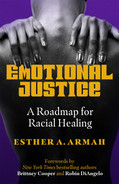![]()
About The Armah Institute of Emotional Justice
This global institute is the implementation home of the Emotional Justice roadmap. We do three things: projects, training, and thought leadership.
We introduce, apply, and implement the Emotional Justice roadmap in these three areas. The AIEJ projects are designed to introduce Emotional Justice to sectors as a change-agent roadmap that centers a practice of equity and empathy. The AIEJ trainings are designed to implement Emotional Justice in organizations and with leaders to make equity and racial healing sustainable practices. AIEJ thought leadership shows how Emotional Justice applies to topical issues as a reimagining of our world and a focus on a fuller humanity.
The AIEJ uses storytelling as a strategy for structural change. We privilege narrative and lead with equity and empathy, with collaboration as a central approach.
Training
The AIEJ researches, devises, designs, and develops flag-ship training that is then carefully shaped to work with each organization in each geographical region. Our training team includes artists, as we use storytelling within our training, and center narrative as a major tool for connection. The following are our flagship trainings:
• The Love Languages of Emotional Justice
• Introduction to Emotional Justice
• Emotional Justice Truth and Accountability Sessions
• Emotional Justice Consultation
• Circle of Willingness
The Love Languages of Emotional Justice
This three-part webinar explores the connection between labor, history, worth, and value for Black, Brown, and Indigenous women leaders and managers. It explores and answers the question, How do we institutionalize wellness, rest, and replenishment within the labor landscape of communities of color? This training introduces the Emotional Justice Equity Package. This training is specifically adapted to other demographics to explore reimagining a labor landscape that institutionalizes wellness.
This training is carefully adapted for two additional demographics: for white leaders in the philanthropic and nonprofit world, to explore their relationship to help and power, as part of a journey to centering an equity practice in this sector; and for white women leaders and managers, to develop a “circle of willingness” to chart a path of transformative change, actively engage resistance negotiation, and develop Emotional Justice as a working tool in their leadership arsenal.
Introduction to Emotional Justice
This is our online two-week course that introduces participants to the Emotional Justice roadmap in an interactive and creative way, with thought-provoking assignments.
Emotional Justice Truth and Accountability Sessions
This three-part workshop followed by 3, 6, 9, or 12 months of facilitation is designed to create a sustainable equity practice within organizations by engaging our Emotional Justice roadmap to decenter whiteness and center Black, Brown, and Indigenous workers as an act of transforming organizational cultures. The post-workshop facilitation is designed to stand the workshop lessons and commitments on their feet and turn intention into outcome-focused equity.
Emotional Justice Consultation
We work with leaders of organizations in these two-part sessions to develop and engage them to devise Action Statements. Given that “public statements” pertaining to issues of race, racism, and racial healing are facing scrutiny and critique, Emotional Justice introduced the Action Statement; it is designed to center accountability, and requires leaders to be specific about the action they are taking to make change within their organization and/or sector.
Circle of Willingness
For white women leaders and managers where we explore their emotional work to unpack, identify, and explore their emotional relationship to whiteness and white masculinity, and how that impacts their power and shapes their leadership.
Projects
Our projects are creative and bold; they center storytelling and global Blackness and are devised to make racial healing a sustainable practice. Project examples include the following:
The Black Frontline
This is the world’s largest oral history project of global Black doctors and nurses sharing their narratives and lived experience working with and navigating COVID-19. We gathered three hundred narratives from the US, the UK, and Ghana with a global team across those three nations to redefine a health care sector of the future that centers equity. The project’s aim is to actively center those who are traditionally marginalized and to offer public health specialists, hospital administrators, and those studying medicine an active path to do this. The Black Frontline is codirected with Dr. Kim Gallon, founder of COVID Black. The narratives are published on the Black Frontline website, allowing public access, and a free curriculum guide is created to enable easy use. The Black Frontline’s institutional home is Brown University in the US. The Black Frontline is a journey of sonic Blackness through the COVID-19 pandemic. It is developed through mixed methodologies and cross collaborations using oral history, journalism, data, and storytelling. It also draws on the theory and application of black digital humanities that, together with Emotional Justice, build an online world of stories, struggle, joy, pain, loss, grief, courage, community, and sacrifice.
Black Grief Matters
This is a three-part project exploring loss and grief through the lens of Black girls and women, as a path to create culturally competent curriculum for Social Emotional Learning educators in the US and the UK, with the goal of reducing suspensions and expulsions of Black girls. The three parts are the Creative Grief Journal, the Black Grief Matters Symposium, and the Black Grief Matters Online Modules Curriculum. The curriculum features case studies from the Creative Grief Journal, and excerpts from the talks delivered by academics, policymakers, and activists during the Symposium.
the STAYED and the STOLEN
This is an immersive experience bringing together Emotional Justice, digital humanities, and the world of gaming to create a transformative tour of the Cape Coast dungeons where enslaved Africans were held before being transported to North America, the Caribbean, Latin America, and Europe. This project focuses on intraracial healing among global Black people, centers Africa as a site of enslavement, and engages the digital to help humanize a dehumanized people.
